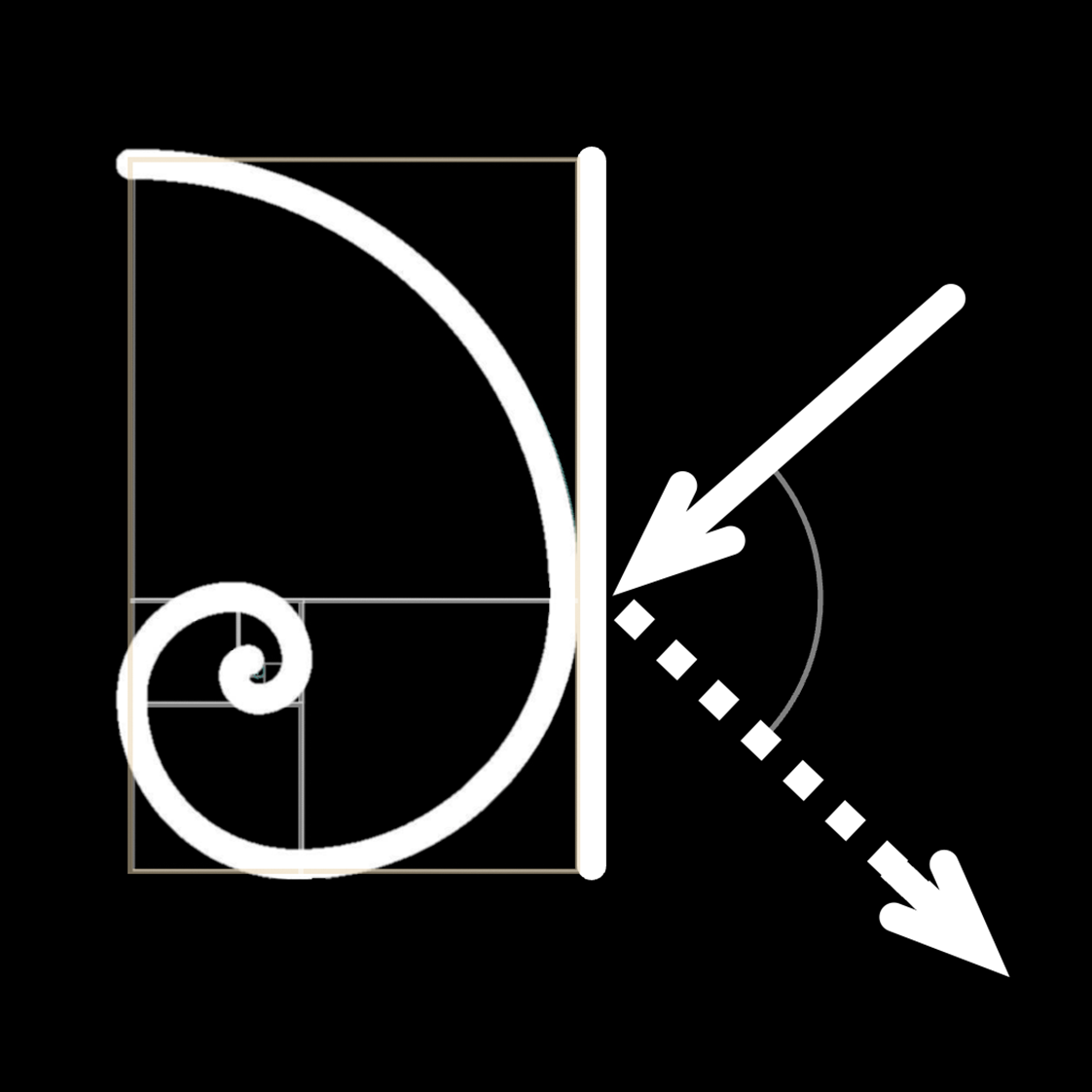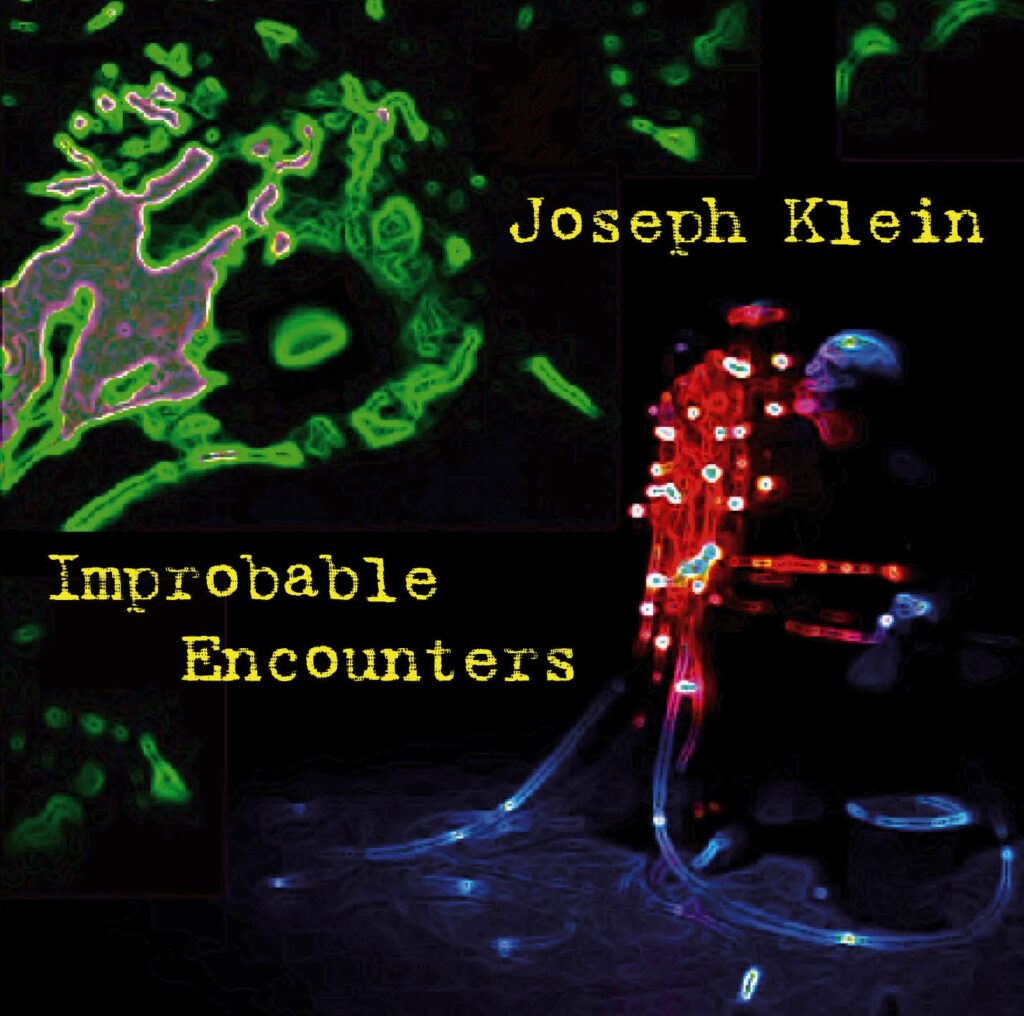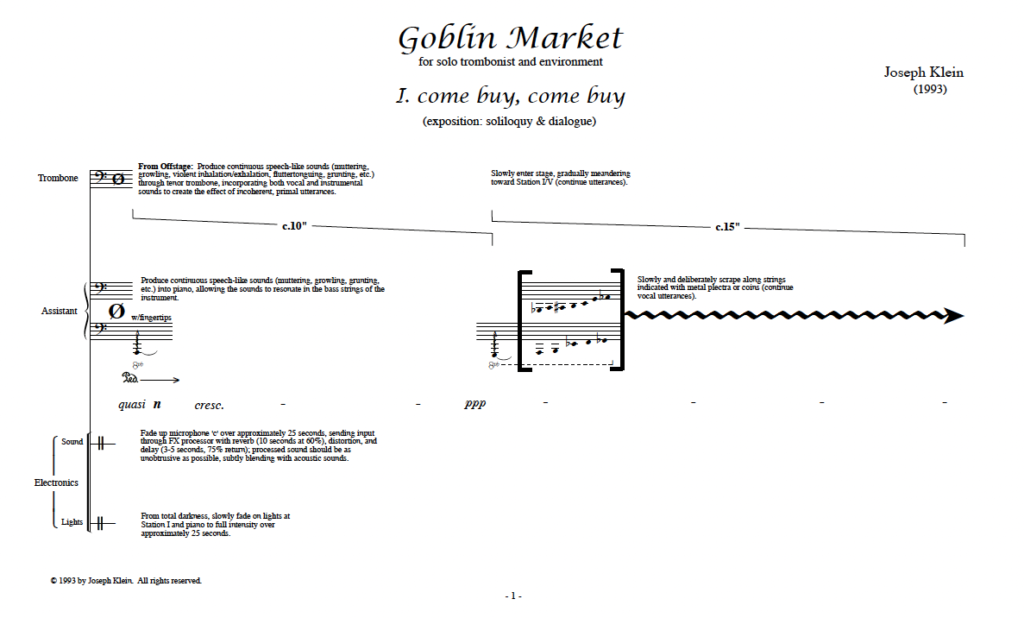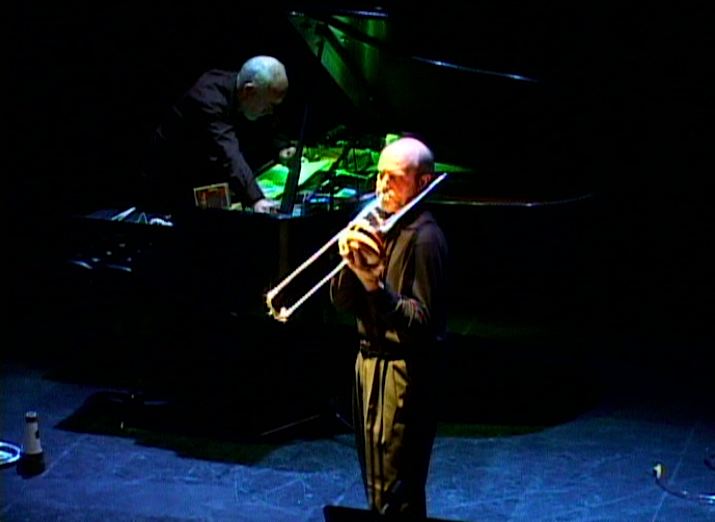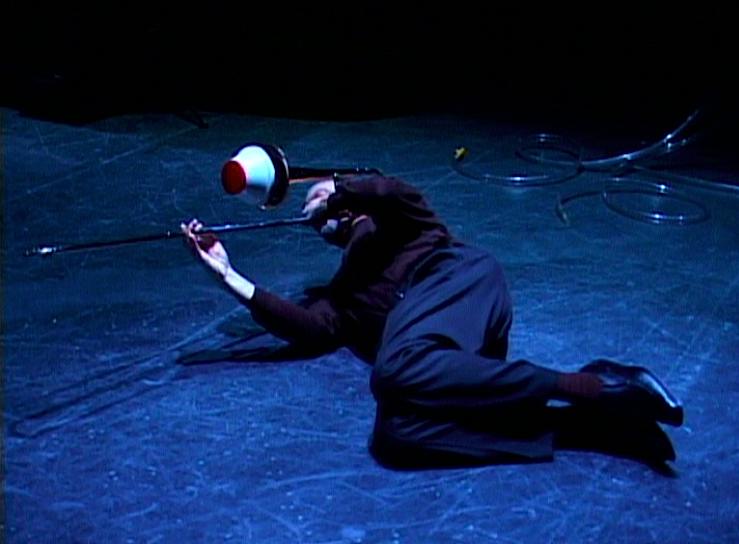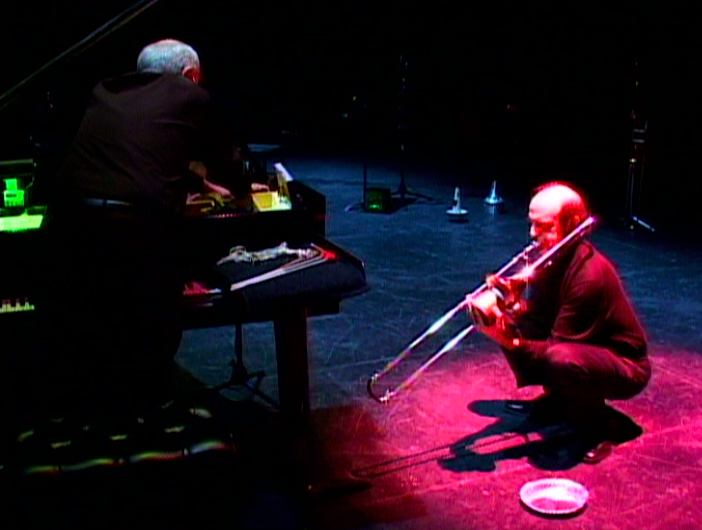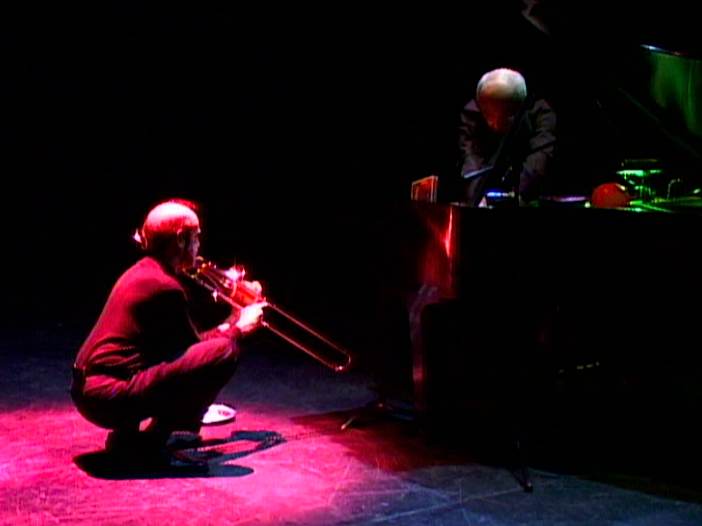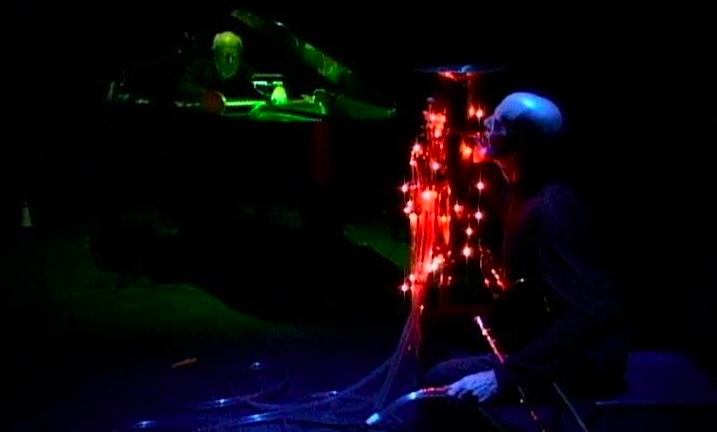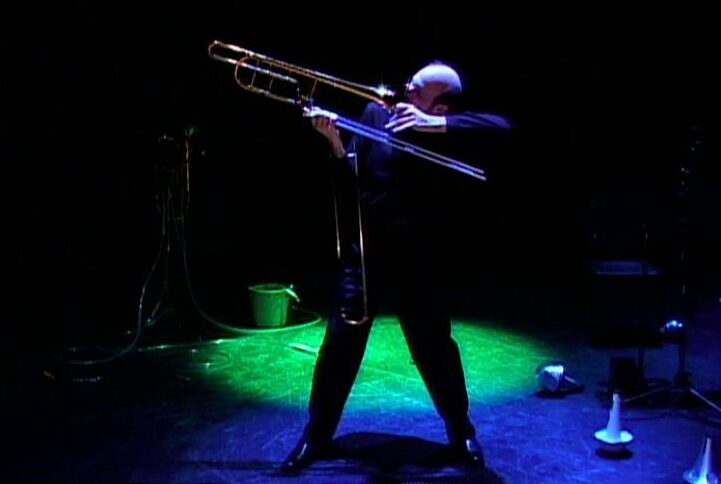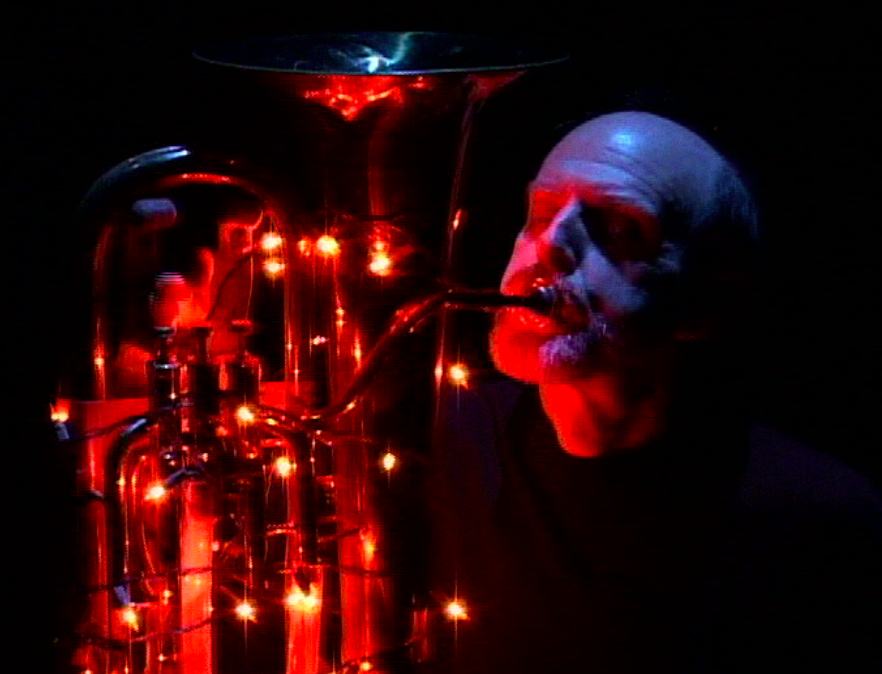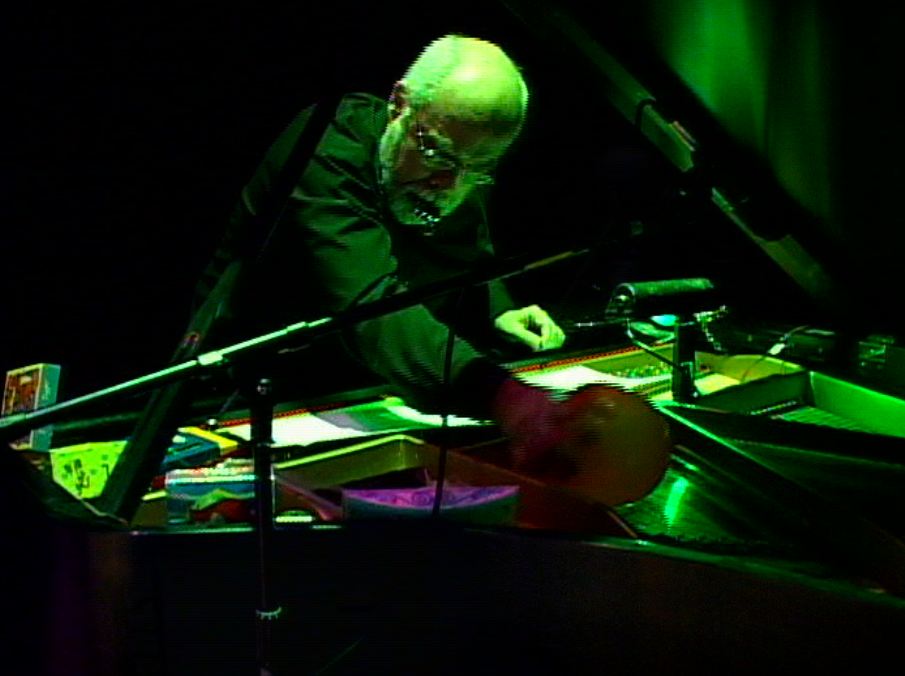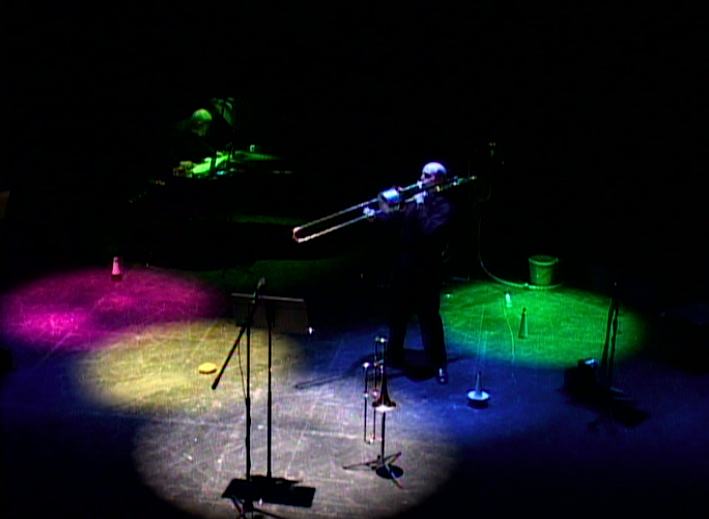Goblin Market
Complete Work Title:
Performance Medium:
Duration:
Date Composed:
Dedication:
Additional Information:
- The intermedia environment includes amplification, live FX processing, computer music, lighting, and staging.
- The piano part is played entirely inside the instrument, with various striking, plucking, and bowing implements.
- Based on the poem by Christina Rossetti (1830-1894).
- Supported by a Composer Fellowship from the National Endowment for the Arts.
- Included on the album Improbable Encounters (innova 873, 2014).
Movements:
- come buy, come buy (exposition: soliloquy and dialogue)
- open heart/absent dream (theme & variations 1-5)
- Theme
- Variation 1: dormant
- Variation 2: pastoral
- Variation 3: melancholy
- Variation 4: empty
- Variation 5: urgent
- Laura dwindling (passacaglia)
- resistance (improvisation)
- bitterness without a name (epilogue: variations 6-12)
- Variation 6: delirious
- Variation 7: passionate
- Variation 8: anxious
- Variation 9: fervid
- Variation 10: resolute
- Variation 11: susurrant
- Variation 12 (coda): reflective
Recording:
Program Note:
Goblin Market was composed in 1993 for trombonist William Bootz, and is based upon the poem of the same name by Pre-Raphaelite poet Christina Rossetti (1830-1894). The work itself is not intended as a programmatic representation of the poem, but is rather a structural and psychological study of the actions and characters portrayed therein; as such, it exists as a parallel or alternate realization of the original, almost as a shadow or specter. The work is divided into five movements, according to the dramatic unfolding of the poem, which is further parsed into sub-sections corresponding to each paragraph of text; thus, the pacing of the musical work is based directly upon that of the poem itself. Rossetti’s poem concerns two sisters, Laura and Lizzie. Each day as they stroll through the woods to the market, they hear the cries of the goblin men, enticing them to come buy their fruits (come buy, come buy). Though the girls are aware of the dangers of listening to the goblin men, Laura one day gives into the temptation. After buying their fruits with a lock of hair and a tear, Laura is treated to tastes and pleasures beyond her imagination. Eager to repeat the encounter the following day, Laura is devastated to find that now only her sister hears the cries of the goblin men (open heart/absent dream). Pining for lost pleasures, Laura begins to waste away (Laura dwindling). In an effort to save her sister, Lizzie confronts the goblin men, but stubbornly refuses to eat their fruits (resistance). Eventually the goblin men give up, leaving Lizzie in disgust (bitterness without a name). The shared experience brings the two sisters together and heals Laura of her wasting anguish.
In the present work, the two main characters of the poem are represented by two complementary pitch cells, one consisting of five pitch classes, the other of seven. This 5:7:12 scheme is applied throughout the poem’s narrative, manifested not only in the pitch material, but in the proportional relationships between the various musical and visual elements as well. The musical-dramatic content of each section of the work is the result of a psychological extrapolation of the drama within the poem, which has then been superimposed upon or recast within more traditional formal models: for example, the theme of the second movement variations is a paraphrase of the second section of the first movement, as well as a miniature set of variations in itself; the variations of the second movement continue in the fifth movement, after being interrupted by movements III and IV; the third movement is a passacaglia based exclusively upon the seven-note pitch cell, and is thus an extension of (or obsession upon) variation 4 of the second movement. In a broad sense then, the entire work may be viewed as a set of variations on the two complementary pitch cells (thus making the second and fifth movements “variations within/upon variations”).
Goblin Market was supported by a Composers Special Project grant from the National Endowment for the Arts. The work was first performed by William Bootz and Douglas Reed on 22 February 1994 at the University of Evansville. It is included on the album Improbable Encounters (innova 873, 2014).
Performance/Broadcast History:
| Date | Venue | Location | Performer(s) |
|---|---|---|---|
| 5 December 2009 | Harold Golen Gallery—Twelve Nights Electronic Music and Arts Festival | Miami, FL | video realization: William Bootz, trombonist; Douglas Reed, piano; Joseph Klein, electronics |
| 8 February 2005 | University of Evansville | Evansville, IN | William Bootz, trombonist; Douglas Reed, piano; Joseph Klein, electronics |
| 1 December 1998 | University of Evansville | Evansville, IN | William Bootz, trombonist; Douglas Reed, piano; Joseph Klein, electronics |
| 11 June 1995 | University of Tulsa—Living Arts of Tulsa New Genre Festival | Tulsa, OK | William Bootz, trombonist; Joseph Klein, piano; Christopher Morgan, electronics |
| 2 June 1995 | University of Nevada, Las Vegas—International Trombone Workshop | Las Vegas, NV | William Bootz, trombonist; Douglas Reed, piano; Joseph Klein, electronics |
| 16 February 1995 | Louisiana Tech University | Ruston, LA | William Bootz, trombonist; Douglas Reed, piano; Joseph Klein, electronics |
| 15 February 1995 | Stephen F. Austin State University | Nacogdoches, TX | William Bootz, trombonist; Douglas Reed, piano; Joseph Klein, electronics |
| 14 February 1995 | University of North Texas | Denton, TX | William Bootz, trombonist; Douglas Reed, piano; Joseph Klein, electronics |
| 13 February 1995 | University of North Texas | Denton, TX | William Bootz, trombonist; Douglas Reed, piano; Joseph Klein, electronics |
| 12 February 1995 | University of Oklahoma | Norman, OK | William Bootz, trombonist; Douglas Reed, piano; Joseph Klein, electronics |
| 27 April 1994 | Indiana University | Bloomington, IN | William Bootz, trombonist; Douglas Reed, piano |
| 30 March 1994 | Morehead State University—MSU New Music Festival | Morehead, KY | William Bootz, trombonist; Douglas Reed, piano; Joseph Klein, electronics |
| 17 March 1994 | Morehead State University—MSU New Music Festival | Morehead, KY | Andrew Glendening, trombonist; Jay Flippin, piano; Joseph Klein, electronics |
| 22 February 1994 | University of Evansville | Evansville, IN | William Bootz, trombonist; Douglas Reed, piano; Joseph Klein, electronics |
